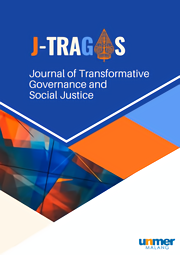Encouraging Anti-Racism Education Policy from Conflict Perspective
DOI:
https://doi.org/10.26905/j-tragos.v1i1.9228Keywords:
Anti-racism, Conflict Reconciliation, Education PolicyAbstract
Since discrimination and labeling of ethnic Chinese are still embedded in society. The goal of this paper is to encourage different policies that try to solve racial conflicts, especially through education as a preventive measure to raise a generation with a lot of knowledge and a lot of patience. This paper reviews various alternative efforts to eliminate the issue of racism among ethnic Chinese. This review finds that reconciliation can be achieved through education and other methods. It is also demonstrates that efforts have been made by the government to initiate anti-racism education as part of the conflict resolution process. Nevertheless, this implementation is a long way from being adequate or successful. There are still many records that need to be corrected and evaluated by the government to encourage anti-racism education policies.Downloads
References
Anne Tupper, J. (2014). The possibilities for reconciliation through difficult dialogues: Treaty education as peacebuilding. Curriculum Inquiry, 44(4), 469-488.
Asmal, K., Asmal, L., & Roberts, R. S. (1997). Reconciliation through truth: A reckoning of apartheid’s criminal governance (Issue 74). New Africa Books.
Aspeslagh, R. (1996). Three decades of peace education around the world. New York: Garland.
Atmaja, H. T., & Sodiq, I. (2017). Konflik Rasial Antara Etnis Tionghoa Dengan Pribumi Jawa di Surakarta Tahun 1972-1998. Journal of Indonesian History, 6(1), 66–74.
Australia Reconciliation. (2020, May 25). National Sorry Day 2020. https://www.reconciliation.org.au/national-sorry-day-2020/
Bar-Tal, D. (2002). The elusive nature of peace education. Peace Education: The Concept, Principles, and Practices around the World, 27–36.
Bar-Tal, D., & Bennink, G. H. (2004). The nature of reconciliation as an outcome and as a process. From Conflict Resolution to Reconciliation, 6, 1–289.
Bjerstedt, A. (1993). Peace education: Global perspectives. Almqvist and Wiksell International.
De Soto, A. (1999). Reflections. Comparative Peace Processes in Latin America, 385–387.
Garcia, C. (1983). Latin American traditions and perspectives. International Review of Education, 29(3), 369–389.
Harris, I. M., & Morrison, M. L. (1998). Peace education. McFarland & Company. Inc. Jefferson, North Carolina and London.
Hattam, R., & Atkinson, S. (2006). Reconciliation as a frame for rethinking racism in Australia. Social Identities, 12(6), 683–700. https://doi.org/10.1080/13504630601030883
Hicks, D. (1988). Education for peace: Issues, principles, and practice in the classroom. Taylor & Francis.
Kelman, H. C. (1999). Transforming the relationship between former enemies: A social-psychological analysis. In RL Rothstein (Ed.), After the Peace: Resistance and Reconciliation.
Khotimah, K. (2013). Respon Komunitas Kunghuchu di Pekanbaru Pasca Keluarnya Kepres RI No. 6 Tahun 2000. TOLERANSI: Media Ilmiah Komunikasi Umat Beragama, 5(2), 107–117.
Lederach, J. P. (1997). Sustainable reconciliation in divided societies. Washington, DC: USIP.
Morrow, D. (1999). Seeking Peace amid the Memories of War: Learning from the Peace Process in Northern Ireland. In After the peace: Resistance and reconciliation (pp. 111–139). Lynne Rienner Publishers.
Murakami, T. (1992). A Comparison of Peace Education in Britain and Japan. Peace Research, 43–53.
Mustajab, A. (2017). Kebijakan Politik Gus Dur Terhadap China Tionghoa di Indonesia. IN RIGHT: Jurnal Agama Dan Hak Azazi Manusia, 5(1).
Nursalim, M. P. (2019). Mitos di media sosial terkait Pilpres 2019. PIKTORIAL: Journal of Humanities, 1(1), 1–14.
Pickett, L. (2008). Integrated Schools in Northern Ireland: Education for Peace and Reconciliation. Childhood Education, 84(6), 351–356. https://doi.org/10.1080/00094056.2008.10523042
Putra, S. D. E. (2017). Menjernihkan Pluralisme di Indonesia Modern. In PLURALISME, MULTIKULTURALISME.
Raditya, A., & Millah, A. S. (2009). Tafsir Konflik-Kekerasan. Kaukaba Dipantara.
Reardon, B. A. (1988). Comprehensive peace education: Educating for global responsibility. ERIC.
Sadigbayli, R. (2006). Peace Education as a Coexistence and Reconciliation Tool: The Context of the Conflict between Armenia and Azerbaijan.
Shonholtz, R. (1998). Conflict resolution moves East: How the emerging democracies of Central and Eastern Europe are facing interethnic conflict. The Handbook of Interethnic Coexistence, 359–368.
Suryadinata, L. (2014). Kebijakan Negara Indonesia terhadap Etnik Tionghoa: Dari Asimilasi ke Multikulturalisme? Antropologi Indonesia, 0(71), 1–12. https://doi.org/10.7454/ai.v0i71.3464
Tov, B. S. (2004). From Conflict Resolution to Reconciliation. In Oxford University Press.
White, T., Owsiak, A., & Clarke, M. (2013). †Extending peace to the grassroots. The need for Reconciliation in Northern Ireland after the Agreement. Lessons from the Northern Ireland Peace Process, 227–267.
Wilmer, F. (1998). The social construction of conflict and reconciliation in the former Yugoslavia. Social Justice, 25(4 (74), 90–113.
Downloads
Additional Files
Published
How to Cite
Issue
Section
License
Authors who publish in this journal agree to the following terms:
(1) Copyright of the published articles will be transferred to the journal as the publisher of the manuscripts. Therefore, the author confirms that the copyright has been managed by the journal.
(2) Publisher of the Journal of Transformative Governance and Social Justice (J-TRAGOS) is the University of Merdeka Malang.
(3) The copyright follows Creative Commons Attribution “ShareAlike License (CC BY SA): This license allows to Share” copy and redistribute the material in any medium or format, Adapt” remix, transform, and build upon the material, for any purpose, even commercially.




